Daily Vocabulary Words: List of Daily Used Words in Leading Indian Newspapers
Hi there. Welcome to this special section @ Wordpandit. Our endeavour here is straightforward: highlighting daily vocabulary words that you would come across in leading newspapers in the country. We have included the following newspapers in our selection:
• The Times of India
• The Economic Times
• Hindustan Times
• Mint
• Indian Express
We are putting in extensive work to develop your vocabulary. All you have to do is be regular with this section and check out this post daily. This is your repository of commonly used words; essentially, we are posting a list of daily used words. Hence, this has significant practical application as it teaches you words that are commonly used in leading publications mentioned above.
Visit the website daily to learn words from leading Indian newspapers.
WORD-1: Succumbing
CONTEXT: the Northeast, despite having played the politics of difference at multiple levels for several decades, seems to be succumbing to the party that is most assimilationist in its agenda.
SOURCE: Times of India
EXPLANATORY PARAGRAPH: Imagine you really, really want to eat a cookie, but mom says “No, it’s almost dinner time.” But the cookie looks so yummy that you just can’t say no, and you eat it anyway. That’s like succumbing; it’s when you give in to something you really want to do, even when you know you probably shouldn’t.
MEANING: Yielding to a stronger force or desire (verb)
PRONUNCIATION: suh-KUHM-ing
SYNONYMS: Yielding, giving in, surrendering, caving, capitulating
USAGE EXAMPLES:
1. She ended up succumbing to the temptation to open her presents before Christmas morning.
2. Despite trying to diet, he succumbed to the delicious smell of fresh doughnuts.
3. The city finally succumbed after a long siege.
4. After resisting for a while, she succumbed to peer pressure and tried skateboarding.
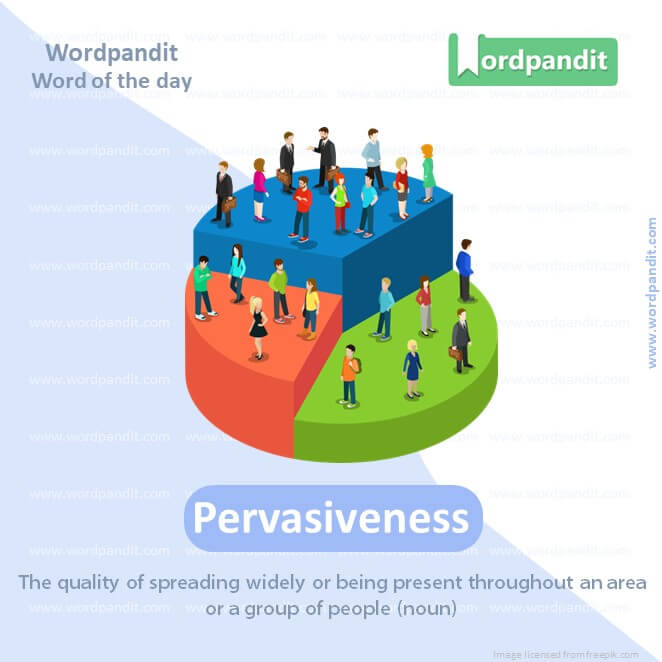
WORD-2: Pervasiveness
CONTEXT: the perception of the pervasiveness of corruption, and whether a particular party was seen as contributing to the moral decline of people by reaping the windfall that the sale of alcohol could bring — were determining factors.
SOURCE: Times of India
EXPLANATORY PARAGRAPH: Pervasiveness is like when the smell of baking cookies spreads all through the house, and you can smell it everywhere you go. It means something is present in all parts of a place or thing.
MEANING: The quality of spreading widely or being present throughout an area or a group of people (noun)
PRONUNCIATION: per-VAY-siv-ness
SYNONYMS: Ubiquity, omnipresence, prevalence, widespreadness, commonness
USAGE EXAMPLES:
1. The pervasiveness of smartphones means that most people are now connected to the internet all the time.
2. We were studying the pervasiveness of certain customs across different cultures.
3. The pervasiveness of the song made it impossible to avoid; it was playing in every store.
4. Environmentalists are concerned about the pervasiveness of plastic waste in the oceans.
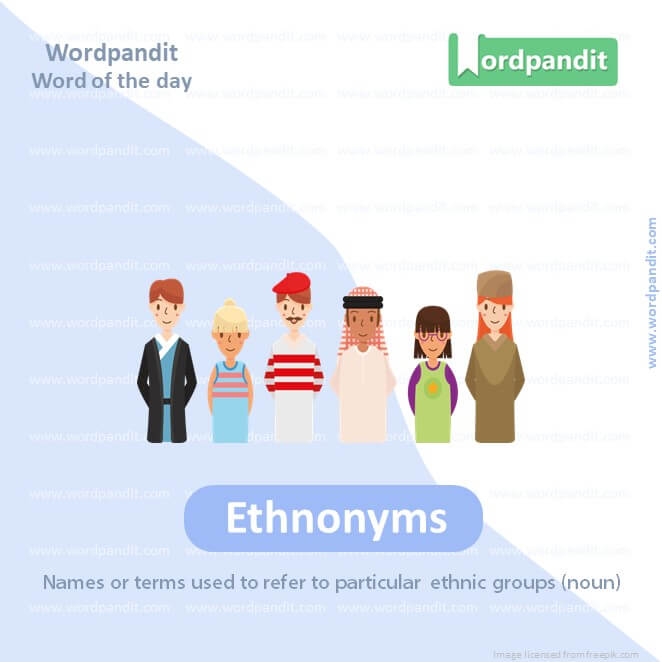
WORD-3: Ethnonyms
CONTEXT: the politics of naming or the salience of ethnonyms and the resultant changing ethnic dynamics is something to look out for in the case of the Mizos and the neighbouring kindred tribes in the coming days.
SOURCE: Hindustan Times
EXPLANATORY PARAGRAPH: Ethnonyms are special names we use to talk about a group of people who have the same culture or come from the same country, like calling someone American because they’re from America.
MEANING: Names or terms used to refer to particular ethnic groups (noun)
PRONUNCIATION: ETH-noh-nimz
SYNONYMS: Ethnic names, tribal names, people names, cultural names, national names
USAGE EXAMPLES:
1. “German” and “French” are ethnonyms used to describe people from Germany and France.
2. In our history class, we learned about the ethnonyms used by indigenous peoples.
3. The ethnonyms of many groups have changed over time as languages evolve.
4. Some ethnonyms are considered disrespectful, and people prefer to be called by their chosen name.
WORD-4: Predominantly
CONTEXT: Although the hard grind of materialistic politics predominantly drives most of the election concerns.
SOURCE: Indian Express
EXPLANATORY PARAGRAPH: If something is predominantly one color, like a mostly green painting with little spots of other colors, it means that green is the color you see the most.
MEANING: Mainly; for the most part (adverb)
PRONUNCIATION: preh-DAH-muh-nunt-lee
SYNONYMS: Mainly, chiefly, primarily, largely, mostly
USAGE EXAMPLES:
1. The room was decorated predominantly in shades of blue.
2. The school is predominantly attended by children from the local area.
3. Her work is predominantly concerned with themes of friendship and trust.
4. The audience was predominantly middle-aged.
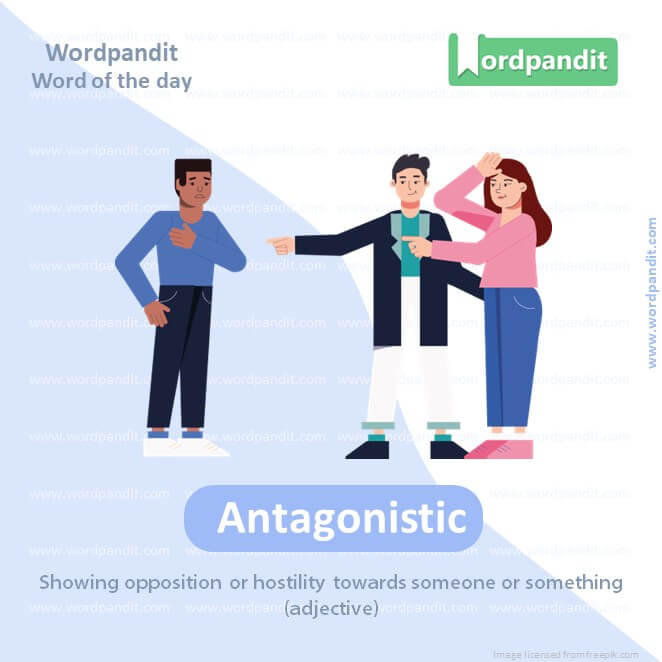
WORD-5: Antagonistic
CONTEXT: His intense forensic examination of violence impelled him to recognize its roots in the divisiveness of antagonistic identities.
SOURCE: Times of India
EXPLANATORY PARAGRAPH: Antagonistic is when you are acting like a superhero’s enemy, always fighting against them or not agreeing with them, like when you don’t want to share your toys with your brother or sister.
MEANING: Showing opposition or hostility towards someone or something (adjective)
PRONUNCIATION: an-tuh-guh-NIS-tik
SYNONYMS: Hostile, adversarial, unfriendly, opposing, contrary
USAGE EXAMPLES:
1. Their relationship became antagonistic after the argument.
2. The two groups have always had an antagonistic stance towards each other.
3. He has an antagonistic approach to any form of criticism.
4. Antagonistic behavior in the workplace can lead to a toxic environment.
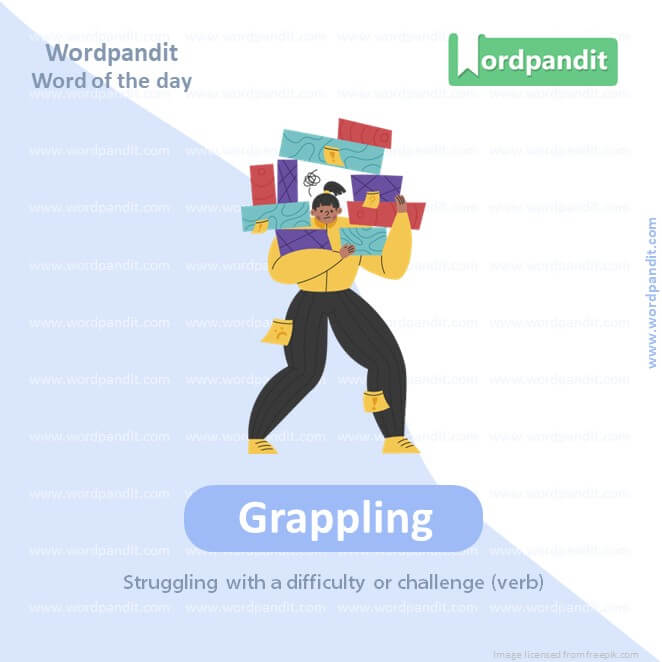
WORD-6: Grappling
CONTEXT: Indian artists and critics were grappling with the dominant paradigm of indigenism.
SOURCE: Indian Express
EXPLANATORY PARAGRAPH: Grappling is like when you’re trying to hold onto a wiggly puppy that doesn’t want to take a bath. It means to struggle or wrestle with something that might be hard to handle.
MEANING: Struggling with a difficulty or challenge (verb)
PRONUNCIATION: GRAP-ling
SYNONYMS: Wrestling, struggling, contending, tussling, striving
USAGE EXAMPLES:
1. She spent all night grappling with the math problem.
2. The new government is grappling with the country’s economic crisis.
3. He was grappling with his feelings after the sudden loss.
4. The wrestlers are grappling for the championship title.
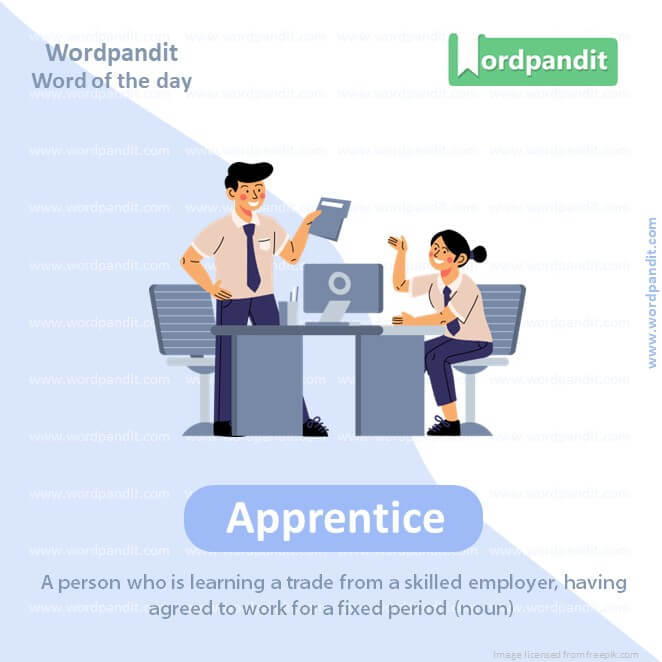
WORD-7: Apprentice
CONTEXT: his first exhibition was apprentice-level work – imitations of Akbar Padamsee’s nudes.
SOURCE: Hindustan Times
EXPLANATORY PARAGRAPH: An apprentice is someone who is learning how to do a job by watching and helping someone who already knows how to do it, like when you help your dad fix the car and learn how to do it yourself.
MEANING: A person who is learning a trade from a skilled employer, having agreed to work for a fixed period (noun)
PRONUNCIATION: uh-PREN-tiss
SYNONYMS: Trainee, learner, novice, intern, protégé
USAGE EXAMPLES:
1. After high school, he decided to become an apprentice to a carpenter.
2. The apprentice worked alongside the master chef to learn the trade.
3. She was an apprentice at a law firm before becoming a lawyer.
4. The workshop takes on several apprentices every year.
WORD-8: Decipher
CONTEXT: I would try to decipher what was passing through his mind as he searched the terraces of the Hanging Gardens, in the distance.
SOURCE: Hindustan Times
EXPLANATORY PARAGRAPH: Decipher is like figuring out a secret code. It means to work out what something means or find the answer to something that is hard to understand.
MEANING: To succeed in understanding, interpreting, or identifying something (verb)
PRONUNCIATION: dee-SY-fer
SYNONYMS: Decode, work out, solve, interpret, unravel
USAGE EXAMPLES:
1. Can you help me decipher this doctor’s handwriting?
2. The team was able to decipher the ancient script using modern technology.
3. He spent hours trying to decipher the complicated instructions.
4. The spy had to decipher the coded messages sent by the agency.
WORD-9: Variegated
CONTEXT: It is my mother-tongue and richly eclectic Through it, I imbibe variegated cultures.
SOURCE: Indian Express
EXPLANATORY PARAGRAPH: Variegated is like a leaf with lots of different colors, not just green. It means something has lots of different parts, colors, or patterns.
MEANING: Exhibiting different colors, especially as irregular patches or streaks (adjective)
PRONUNCIATION: VAIR-ee-uh-gay-tid
SYNONYMS: Multicolored, colorful, varied, diversified, mottled
USAGE EXAMPLES:
1. The garden was full of variegated plants and flowers.
2. She wore a variegated scarf that had all the colors of the rainbow.
3. The variegated marble of the floor was imported from Italy.
4. Their variegated lineup of products caters to all tastes.
WORD-10: Apprehensions
CONTEXT: This is reflective of the anxieties and apprehensions produced by the grandiose claims.
SOURCE: Indian Express
EXPLANATORY PARAGRAPH: Apprehensions are like the butterflies you feel in your stomach before the first day of school. It means you’re worried or scared that something bad is going to happen.
MEANING: Feelings of anxiety or fear that something bad or unpleasant will happen (noun)
PRONUNCIATION: ap-ri-HEN-shuns
SYNONYMS: Fears, anxieties, misgivings, worries, concerns
USAGE EXAMPLES:
1. He had some apprehensions about flying for the first time.
2. Despite her apprehensions, she went on stage and gave a great performance.
3. The apprehensions about the new project were discussed in the meeting.
4. The night before the surgery, she was filled with apprehensions.
vocabulary subject
The journey to become adept in any language, be it native or foreign, lies significantly in mastering the vocabulary subject. Understanding different words, their meanings, usage, and nuances drives effective communication and comprehension. But how should one precisely approach the vocabulary subject to maximize learning?
First, it’s essential to understand that the vocabulary subject isn’t a standalone part of language learning. It embeds itself within grammar, listening, speaking, reading, and writing skills. So, instead of rote memorization, integrating vocabulary learning into these activities offers practical exposure and application.
One effective method to navigate the vocabulary subject is to leverage the principle of repetition. Learning a new word once is not enough, and the key to effective retention is revisiting. It doesn’t mean you mechanically repeat words but rethink them in different contexts. Engaging with the word in different sentences, stories, or real-life conversations can enhance understanding and retention.
Next, the vocabulary subject often presents a challenge due to the sheer volume of words. The best approach here is prioritization. Focus primarily on frequently used words and phrases, gradually expanding your scope. Understand their meanings and try to use them in daily conversation. Progress may feel slow, but remember, it’s better to know 100 words you can use than 1000 words you can’t.
To add an element of fun while handling the vocabulary subject, try incorporating games like crossword puzzles, Scrabble, or word search. These keep the spirit of learning alive and can greatly increase your attention span.
Lastly, keep in mind that learning the vocabulary subject is a continuous process. The beauty of any language lies in its evolution, with new words and phrases being added regularly. So, embrace the journey of learning, stay patient and consistent, and you will undoubtedly conquer the fascinating world of vocabulary.













